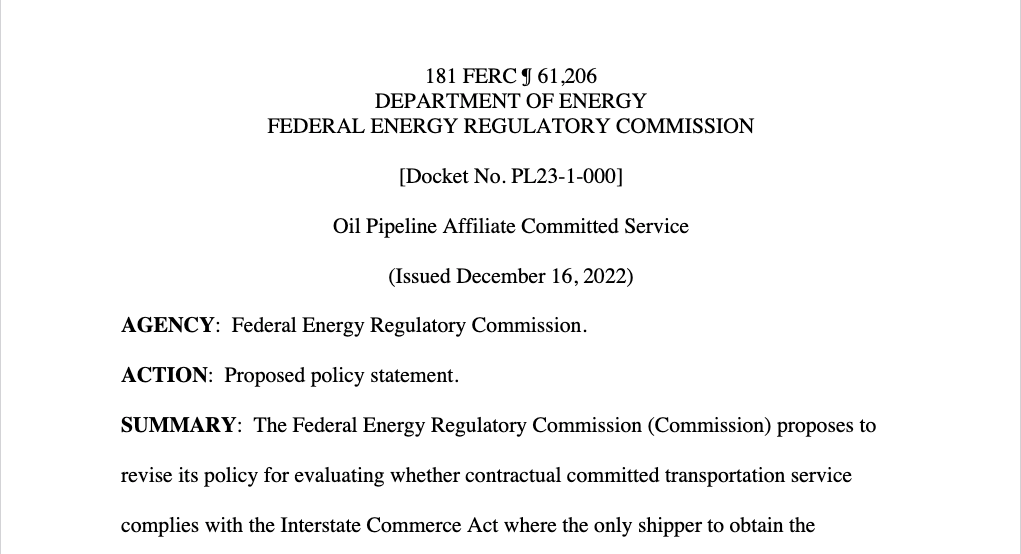New Policy: Oil Pipeline Affiliate Committed Service
FERC issued a proposed policy concerning the standards it should use for determining whether a contract with an affiliate of a pipeline for committed service is just and reasonable and not unduly discriminatory. It proposed a safe harbor for affiliate agreements, but as Commissioner Danly pointed out in his dissent, most of the conditions required to satisfy the safe harbor were deemed commercially nonviable when proposed in a similar draft two years ago. Therefore, it may be that this policy has as much of a chance of being finally adopted as that one did. In any event, comments are due by February 13, 2023, with Reply Comments due by March 30, 2023. Those looking for comments on the prior version referenced by Commissioner Danly should check FERC Docket PL21-1.

Magellan Midstream Partners
Since 2018, Magellan has awaited a decision on its request for rehearing on its 2017 request for declaratory order (originally denied) seeking permission to create a marketing affiliate. Enterprise Products Partners, Medallion Pipeline Company and Plains also asked FERC to either vacate the order, clarify it or grant rehearing.
FERC made some tweaks to the original order, but generally denied the rehearing requests. The decision makes clear that an affiliate marketer may offer services to other parties except in very limited circumstances. As described in the order, the prohibited transactions can be expressed algebraically.
If T > D + K, then the affiliated transaction is an illegal rebate. According to the order, T in the equation is equal to the full tariff rate applicable to the affiliated shipper’s movement under its contract on the pipeline. D is the price differential the affiliated shipper receives from its third-party transaction, but D does not have to be measured on the daily spot prices in the origin and destination markets, but can take into account the actual prices paid and received by the affiliated marketer or the market rate differentials over the entire term of the contract at the origin and the destination. Finally K is the economic value to the marketing affiliate’s customer for non-transportation benefits such as avoiding a contract breach, shutting down a refinery or storage facility, shutting in production from a plant, or preserving its allocation rights under the pipeline’s prorationing policy.
Background reading:
Magellan v. Occidental - Playing Devil's Advocate?
Magellan, Plains, Among Others, Request Marketing Affiliate Clarification
Enerplus vs. Targa
FERC denied an outstanding complaint by Enerplus as being internally inconsistent, but launched its own investigation into whether Targa continues to qualify for a waiver of the tariff filing and financial reporting requirements of the ICA and whether Targa is currently providing jurisdictional transportation service in violation of the ICA.
More detail:
Enerplus and Targa Start a Fight That Could Impact All Liquids Pipelines
Plus, Rough Rider Operating
On similar grounds for why it was launching an investigation into Targa, FERC also denied a similar request for a waiver of the ICA’s tariff filing and financial reporting requirements filed by Rough Rider Operating for a pipeline it intends to operate in North Dakota. FERC found the fact that Rough Rider will own all of the oil being transported does not entitle it to a waiver when Rough Rider intends to purchase the crude oil from a producer prior to it entering the pipeline and then sell the crude oil back to the third-party producer from whom it was purchased once the crude oil is delivered to one of the delivery points of the pipeline. According to FERC, the transactions proposed by Rough Rider with unrelated parties appear to be “equivalent to transportation.”
Spire STL Pipeline Certificate
In April 2020, Spire STL pipeline’s certificate was appealed in the DC Circuit by the Environmental Defense Fund (EDF), which argued FERC should have looked beyond the single precedent agreement between the pipeline and its affiliate to determine if there was truly a market need for the capacity. Last week, FERC issued Spire a permanent certificate to operate the pipeline even though in his concurrence, Chairman Glick noted that the original decision “was a mistake.” He noted that because of Spire Missouri’s post-certificate actions in the three years since the Spire STL Pipeline entered service, “the Spire STL Pipeline is needed to maintain reliable service of natural gas to Spire Missouri’s customers.”
Previous Coverage:
Gas Pipeline Industry Dodges a Bullet with PennEast Win, But Spire STL May Lose Its Certificate